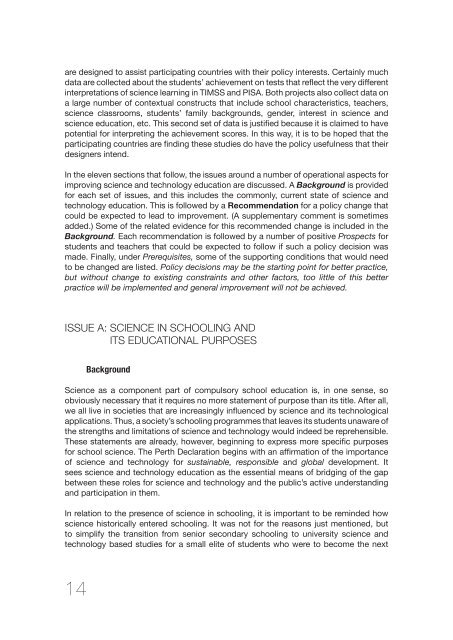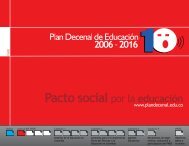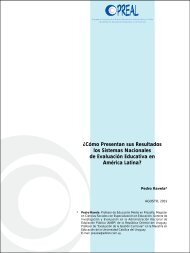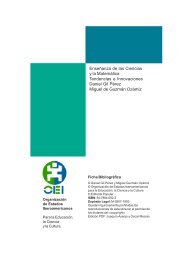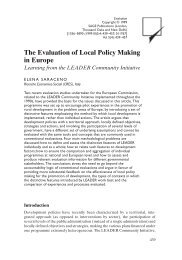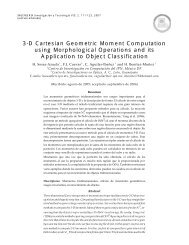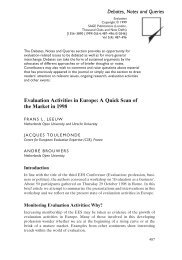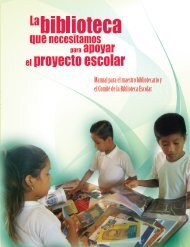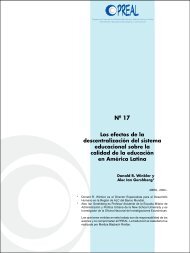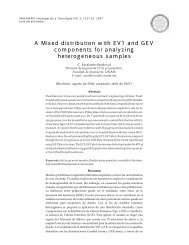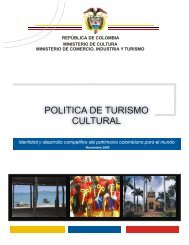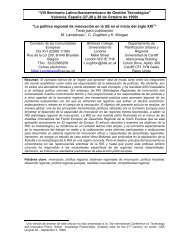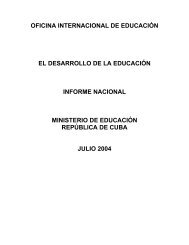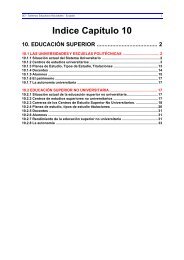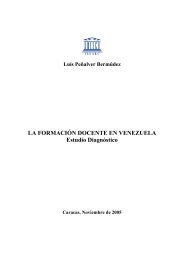Science education policy-making: eleven emerging issues; 2008 - OEI
Science education policy-making: eleven emerging issues; 2008 - OEI
Science education policy-making: eleven emerging issues; 2008 - OEI
Create successful ePaper yourself
Turn your PDF publications into a flip-book with our unique Google optimized e-Paper software.
are designed to assist participating countries with their <strong>policy</strong> interests. Certainly much<br />
data are collected about the students’ achievement on tests that reflect the very different<br />
interpretations of science learning in TIMSS and PISA. Both projects also collect data on<br />
a large number of contextual constructs that include school characteristics, teachers,<br />
science classrooms, students’ family backgrounds, gender, interest in science and<br />
science <strong>education</strong>, etc. This second set of data is justified because it is claimed to have<br />
potential for interpreting the achievement scores. In this way, it is to be hoped that the<br />
participating countries are finding these studies do have the <strong>policy</strong> usefulness that their<br />
designers intend.<br />
In the <strong>eleven</strong> sections that follow, the <strong>issues</strong> around a number of operational aspects for<br />
improving science and technology <strong>education</strong> are discussed. A Background is provided<br />
for each set of <strong>issues</strong>, and this includes the commonly, current state of science and<br />
technology <strong>education</strong>. This is followed by a Recommendation for a <strong>policy</strong> change that<br />
could be expected to lead to improvement. (A supplementary comment is sometimes<br />
added.) Some of the related evidence for this recommended change is included in the<br />
Background. Each recommendation is followed by a number of positive Prospects for<br />
students and teachers that could be expected to follow if such a <strong>policy</strong> decision was<br />
made. Finally, under Prerequisites, some of the supporting conditions that would need<br />
to be changed are listed. Policy decisions may be the starting point for better practice,<br />
but without change to existing constraints and other factors, too little of this better<br />
practice will be implemented and general improvement will not be achieved.<br />
ISSUE A: SCIENCE IN SCHOOLING AND<br />
ITS EDUCATIONAL PURPOSES<br />
Background<br />
<strong>Science</strong> as a component part of compulsory school <strong>education</strong> is, in one sense, so<br />
obviously necessary that it requires no more statement of purpose than its title. After all,<br />
we all live in societies that are increasingly influenced by science and its technological<br />
applications. Thus, a society’s schooling programmes that leaves its students unaware of<br />
the strengths and limitations of science and technology would indeed be reprehensible.<br />
These statements are already, however, beginning to express more specific purposes<br />
for school science. The Perth Declaration begins with an affirmation of the importance<br />
of science and technology for sustainable, responsible and global development. It<br />
sees science and technology <strong>education</strong> as the essential means of bridging of the gap<br />
between these roles for science and technology and the public’s active understanding<br />
and participation in them.<br />
In relation to the presence of science in schooling, it is important to be reminded how<br />
science historically entered schooling. It was not for the reasons just mentioned, but<br />
to simplify the transition from senior secondary schooling to university science and<br />
technology based studies for a small elite of students who were to become the next<br />
14


